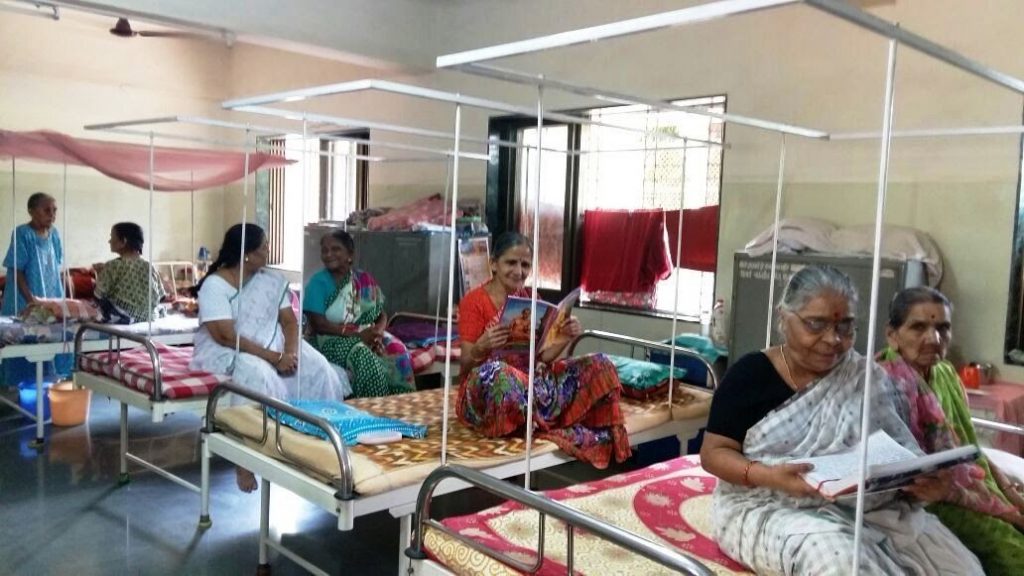New Delhi: Cooking, exercising, baking and gardening are among the means adopted by the elderly at old age homes to keep dark thoughts away during the novel coronavirus pandemic.
Many elderly say they have had a difficult life — facing abuse and torture from their own family members — but trying to cope up with the trauma of being highly vulnerable to COVID-19 has proved to be another turning point in their lives.
As the world is set to mark Elder Abuse Awareness Day Monday, many senior citizens, living in old age homes, share how they are dealing with ongoing coronavirus crisis.
Nirmala aunty, as she is fondly called at the Mann Ka Tilak old age home in Delhi, keeps herself busy through cooking.
“I love cooking and I regularly help out with the kitchen. If it’s not too hot, I sit outside in the garden and help chop up the vegetables,” the 65-year-old said. “Being busy keeps away all the dark thoughts that sometimes come in my head.”
Sam, another resident of the old-age home, uses exercise to keep himself fit and healthy
“I exercise daily and do yoga to keep myself fit and healthy. All the residents join me in the morning yoga session,” the 75-year-old said. “We end the session with a few minutes of meditation. It leaves everyone very refreshed.”
Seventy-one-year-old Madan helps the caretakers’ children study and also plays board games like ludo and carrom with them to keep himself occupied.
Gayatri, 67, says she spends her day listening to ‘bhajans’.
“They give me lot of peace and help calm any fears I have. I also take care of the kitchen garden. We grow lots of herbs and vegetables,” she said. “I feel very proud that we make dishes out of the things that we grow ourselves!”
Shabnam (name changed), a resident of an old-age home in Aligarh, Uttar Pradesh, says she has started baking to ensure that her mind is occupied.
“It was my childhood hobby. I would make cakes and pastries with my mother in a bakery that we owned. I couldn’t pursue it after marriage,” she said.
The 72-year-old underlined that this was an ideal time to pursue it again as she had been depressed and restless due to the pandemic.
“Ever since lockdown, even my children have not visited me. So there is nothing else to look forward to, so I’m rigorously baking cookies, cakes for other residents,” the septuagenarian said.
“I have started getting requests for baking birthday cakes too now,” she added.
Farzana (name changed) has been concentrating on building her immunity, which she says has also become a hobby in the recent months.
“I eat one garlic clove every morning and do brisk walking. I am also eating only healthy in less oil to ensure my cholesterol level stays in check,” the 67-year-old said.
“The situation is extremely scary and the news reports of the pandemic rise keeps me on edge. Working towards keeping myself safe gives me peace,” she said.
Based on the profile of elderly persons in the country, a government report had stated that there were 10.38 crore (8.6 per cent of the population) elderly persons in 2011 as compared to 7.66 crore (5.6 per cent) in 2001.
The Centre had recently said the elderly accounted for over 50 per cent of the country’s COVID-19 deaths.
People aged 60 to 74 accounted for 38 per cent of the coronavirus deaths, while those above 74 years constituted 12 per cent of the total deaths.
Geetanjali Chopra, founder and president of Wishes and Blessings NGO and Mann Ka Tilak old-age home, said the residents of the old age homes were extremely susceptible to the virus due to their age and health conditions.
“Many came to us when they were frail and under-nourished. It’s only with regular care and attention that we have been able to improve their health and immunities,” Chopra said.
“However, with newer residents, there is still a long way to go,” she said.
Chopra said many are at an age where they find difficulties in processing information that is completely new to them.
“They don’t understand why they their movement has been restricted, why they cannot go to the temple, why they cannot walk down to the lake and why there are no people visiting,” she said.
According to her, the initial few weeks were difficult. The restrictions did bring displeasure and there was a slight downfall in morale.
It took a lot of patience and repeated efforts to explain the urgency of the situation at hand and, slowly, most members came to terms with it, she said.
Chopra stated that some residents were too aged and still don’t comprehend the danger associated with free movement.
“The silver lining to this is that the lockdown has given them ample time to build even stronger bonds with each other,” she said.
“They keep up to date with all news and hold robust discussions on the happenings across the world.”
PTI
